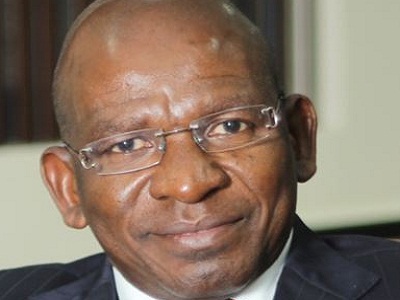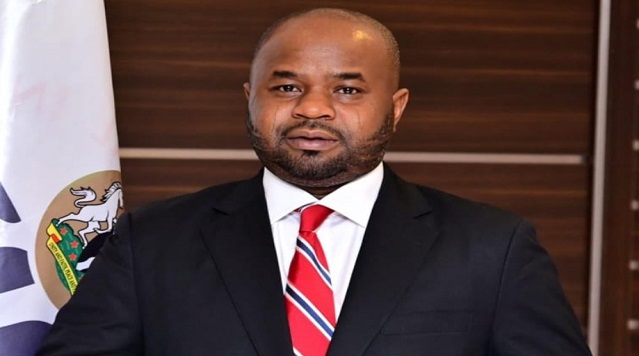News
NESG Lauds 2021 Finance Act, Seeks Implementation

The Nigerian Economic Summit Group, NESG, has lauded 2021 Finance Act as it enhances non-oil revenue and supports the implementation of Nigeria’s annual budget.

This was stated by Laoye Jaiyeola, the CEO of the NESG, who was represented by a Board member of the NESG, Nnanna Ude, during a webinar on ‘Impact Assessment of 2021 Finance Act The Fiscal Policy Roundtable the NESG’.
Jaiyeola said the Fiscal Policy and Planning, Trade Investment and Competitive Policy Commission of the NESG organised the event in order to address the impact of the 2021 Finance Act on the macro and micro economy of the nation.
He also explained that the primary objective of the 2021 Finance Act is to enhance non-oil revenue and support the implementation of Nigeria’s annual budget and that the Act addresses critical areas including fiscal policy, domestic mobilisation, tax administration, financial sector reforms and public financial management, noting that the 2021 Finance Act will accelerate non-oil revenue generation and help close the widening fiscal gap.
However, he (Jaiyeola) pointed that the 2021 Finance Act poses “a dilemma on how much tax revenue can be raised without a deleterious impact on households and that it introduced some tax increases that may be burdensome for individuals businesses”, and that impact assessment of the 2021 Finance Act with the aid of evidence-based advocacy to assess the impact on households, sub-sectors and its wide economic impact will aid the identification of crucial bottlenecks while articulating an action plan that will assist the implementation of the Act.
Also speaking was the thematic lead, Fiscal Policy and Planning, Trade Investment and Competitive Policy Commission of the NESG, Taiwo Oyedele, asserted that the fiscal landscape must be seen from the perspective of public debt, public revenue and public spending, noting that Nigeria’s debt is growing faster than her revenue.
According to Oyedele, Nigeria’s tax base is small and faces structural problems, but policies must be instituted to solve the issues by ensuring appropriate fiscal policy responses and review of extant laws while encouraging growth and raising revenue.
The president of the Manufacturers Association of Nigeria, MAN, Engineer Mansur Ahmed, during the panel discussion, pointed that it is needful to put short- and long-term considerations into the implementation of the 2021 Finance Act.
Ahmed maintained that the need to balance revenue mobilisation alongside tax burden on taxpayers and that for government to improve revenue, there is a need to critically analyse the fiscal space with consideration of Nigeria’s tax net not broad enough to ensure that taxable people pay the right amount of taxes as at when due.
“The finance act 2021 introduced technology for tax collection. It must be implemented so that taxpayers don’t see it as an additional burden, and stakeholders should be sensitized, helped or exempted, particularly small and medium scale businesses.
“Regulators should become more effective and help promote the growth of relevant sectors and should not see themselves as gate-keepers of incentives but help ensure that the implementation of the Act does not hamper small businesses.
“The manufacturing and industrial sectors should be supported to strengthen their capacity and competitiveness, especially considering the African Continental Free Trade Area (AfCFTA)”, he stated.
Also speaking was the Vice President and Managing Director of Coca-cola Nigeria, Alfred Olajide, made it clear that all arms of government have to collaborate in attracting foreign and local investors.
Olajide noted that sections of the 2021 Finance Act, including the Excise duties, are targeted at production, as opposed to consumption.
Meanwhile, the President of the Nigeria, NLC, Comrade Ayuba Wabba wo was represented by Head, Research Department, NLC, Dr Onoho’Omhen Ebhohimien, asserted that subsidy on petroleum products ought to be provided to firms that would reduce production costs, and then passed on down to encourage consumption, but that is not the case in Nigeria due to several factors including the fact that Nigeria imports petroleum products which makes the country subject to the volatility of the foreign exchange market.
“Insurance of the petroleum products, the vessels and freight charges make up 74 percent of petroleum subsidy in Nigeria. Every barrel of crude oil contains 1,500 bye products.
“We export the crude and import only six refined products. The theory of subsidy is not sustainable”, Wuba added.
Temi Popoola, the Chief Executive Officer, CEO, Nigeria Exchange Limited, pointed that the 2021 Finance Act currently helps the government in diversifying its resources.
Popoola also said it has helped provide clarity, strengthen the capital market and eliminate double taxation.
He added that the Act has helped boost investor confidence, but it still has the potential to stifle investors, which may create long-term problems.
News
Trump Says He Made no Mistake Sharing Video Depicting Obamas as Apes

United States President Donald Trump has said he made no mistake for a video briefly shared on his official Truth Social account that depicted former President Barack Obama and former First Lady Michelle Obama as apes.

Former President Barack Obama
Speaking late Friday to reporters accompanying him aboard Air Force One, Trump insisted he made no mistake by sharing the video and does not need to apologise.
“I didn’t make a mistake,” he said.
Trump explained that he did not watch the entire clip before it was posted.
“I didn’t see the whole thing. I looked at the first part, and it was really about voter fraud in the machines, how crooked it is, how disgusting it is.
“Then I gave it to the people. Generally, they look at the whole thing. But I guess somebody didn’t,” he said.
When asked directly whether he condemned the video’s content, Trump replied, “Of course I do.”
The video, which was posted late Thursday, pushed a conspiracy theory about voting machines used during the 2020 election and included a racist depiction of the Obamas.
It remained on Trump’s Truth Social account for about 12 hours before being deleted on Friday morning, following widespread bipartisan calls for its removal.
The White House initially defended the post in an emailed statement to reporters on Friday morning by Karoline Leavitt, Press Secretary,.
She said, “This is from an internet meme video depicting President Trump as the King of the Jungle and Democrats as characters from The Lion King.”
Leavitt added, “Please stop the fake outrage and report on something today that actually matters to the American public.”
Hours after the statement was issued, the video was removed from Trump’s official Truth Social account.
News
Orya, Ex-NEXIM MD Jailed 490 Years for N2.4Bn Fraud

Robert Orya, former managing director, Nigerian Export-Import Bank, (NEXIM), has been sentenced to a cumulative 490 years’ imprisonment over a N2.4 billion fraud, following his conviction by a Federal Capital Territory (FCT) High Court in Abuja.

The conviction was secured by the Economic and Financial Crimes Commission (EFCC). Justice F. E. Messiri sentenced Orya to 10 years’ imprisonment on each of the 49 counts brought against him, with the sentences running cumulatively.
Orya, who headed NEXIM Bank between 2011 and 2016, was prosecuted by Samuel Ugwuegbulam, EFCC counsel.
The anti-graft agency accused him of fraudulently diverting funds belonging to the bank—charges the court held were proven beyond reasonable doubt.
Delivering judgment, Justice Messiri ruled that the prosecution successfully established its case, finding the former bank chief guilty on all 49 counts of fraud.
The conviction has been widely linked to the renewed momentum within the EFCC under Mr. Ola Olukoyede, its Chairman, whose leadership has seen a reinvigoration of the agency’s resolve to pursue high-profile corruption cases to their logical conclusion.
Since assuming office, Olukoyede has repeatedly vowed that no individual, regardless of status or past influence, would be shielded from accountability.
Under his stewardship, the EFCC has intensified the prosecution of complex financial crimes, particularly cases involving public institutions and large-scale diversion of funds.
Observers say the sentencing of a former chief executive of a government-owned bank underscores the EFCC’s determination to restore public confidence in the anti-corruption fight and sends a strong signal that financial misconduct will attract severe consequences.
The judgment is regarded as one of the most significant convictions secured against a former banking chief in recent years, reinforcing the agency’s resolve to clamp down on economic crimes within Nigeria’s financial sector.
During his tenure at NEXIM Bank, Orya was initially credited with efforts to reposition the institution to support non-oil exports and improve its financial standing after earlier setbacks.
However, his administration later became enmeshed in controversies, including allegations of loan disbursement irregularities and procedural abuses.
The case, which culminated in Thursday’s judgment, centred on findings that Orya diverted public funds estimated at N2.4 billion—offences that ultimately led to his conviction and lengthy prison sentence.
News
NRS Chairman Outlines Ways Nigeria can Move from Potential to Economic Prosperity

Zacch Adedeji, chairman of the Nigeria Revenue Service (NRS) has called for a paradigm shift in dependence on raw material exports to one that embrace ideas, innovation and the production of complex products as a pathway to sustainable economic growth and national prosperity.

Adedeji made the submission while delivering the maiden distinguished personality lecture of the Faculty of Administration, Obafemi Awolowo University (OAU), Ile-Ife, Osun State, on Thursday.
A statement by his Special Adviser on Media, Dare Adekanmbi, said Adedeji, in the lecture entitled, ‘From Potential to Prosperity: Export-led Economy’, stressed the need to rethink growth through the lens of complexity by not just producing more of the same stuff.
He lamented that Nigeria possesses a high-tech oil sector and low-productivity informal sector as well as lacking “the vibrant, labour-absorbing industrial base that serves as a bridge to higher complexity.”
The NRS boss stated that Nigeria witnessed stagnation in its exportation drive for three decades between 1998 to 2023, and only added six new products in its export basket list between 2008 and 2023.
“Because of our current position, the Harvard Atlas concluded that we are positioned to take advantage of very few opportunities to diversify using what we already know.”
Adedeji urged Nigeria to learn from the world by comparative study of success and failure like Vietnam, Bangladesh, Indonesia, South Africa and Brazil.
“We are not just looking at numbers in a vacuum; we are looking at the strategic choices made by nations like Vietnam, Indonesia, Bangladesh, Brazil, and South Africa over the same twenty-five-year period. While there are many ways to under perform, the path to success is remarkably consistent: it is defined by a clear strategy to build economic complexity.
“When we put these stories together, the divergence is clear. Vietnam used global trade to build a resilient, complex economy, while the others remained dependent on natural resources or a single low-tech niche.
“There are three big lessons here for us in Nigeria as we think about our roadmap. First, avoiding the resource curse is necessary, but it is not enough. You need a proactive strategy to build productive capabilities.
“Vietnam’s success came from integrating itself into Global Value Chains (GVCs). They positioned themselves as the assembly hub for the world’s electronics, importing high-tech parts and exporting finished products.
“This allowed them to “borrow” technology and management skills from abroad to build their own know-how.
“Nigeria, on the other hand, remains a supplier of raw materials to these chains, not an active participant within them. We must realise that productive capabilities are not permanent. The examples of South Africa and Brazil show us that you can actually lose your industrial edge if you are not careful. Over-reliance on the easy path of resource extraction creates economic and political incentives that crowd out the difficult, long-term work of building an industrial base.”
He added that for Nigeria, which is at an even earlier stage of development and even less diversified than these nations, the warning is stark.
“Relying solely on our natural endowments isn’t just a path to stagnation; it’s a path to regression. The global economy increasingly rewards knowledge and complexity, not just what you can dig out of the ground. If we want to move from potential to prosperity, we must stop being just a source of raw materials and start being a source of ideas, innovation, and complex products.
He added that President Bola Tinubu has already begun the difficult work of rebuilding the economy to ensure collective knowledge to innovate, produce and build a resilient economy.
“The journey from potential to prosperity is not a short one, but with the right map and the right resolve, it is a journey we can finally complete,’ he added.

 Telecom2 days ago
Telecom2 days agoMTN Guns for $2.76bn IHS Towers Buyout in African Telecom Power Grab

 E-Financial2 days ago
E-Financial2 days agoIncentives alone won’t win over Africa’s next billion fintech users — Kuda MFB MD

 Telecom2 days ago
Telecom2 days agoGoogle Calls on Africa’s AI Trailblazers for 10th Startup Accelerator Cohort

 E-Business2 days ago
E-Business2 days agoFirm Reviews the Evolution of Phishing Threats in 2025

 General News1 day ago
General News1 day agoGlobacom Donates ₦1Bn to Lagos State Security Trust Fund

 General News2 days ago
General News2 days agoEdTech Platform Unveils over 5,000 Self-Paced Courses for Skills, Knowledge, and Literacy

 Telecom2 days ago
Telecom2 days agoOptasia Drives Responsible AI Conversation at Nigeria’s Privacy Week 2026

 Telecom1 day ago
Telecom1 day agoAirtel Nigeria Commits to Upgrade of its Network Infrastructure for Improved Quality of Service

























